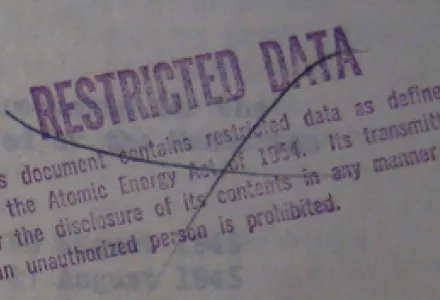Alex Wellerstein will present a Managing the Atom seminar entitled "'Restricted Data': The Regulation of Nuclear Knowledge in the United States" on Tuesday October 12, 2010 at 9:30am in the Belfer Center library.
Wellerstein's talk will give a broad historical overview of the development of this parallel secrecy system, from its origins in the immediate wake of World War II, through its revamping in the early post-Cold War. Since 1947, the United States government has regulated nuclear knowledge as a category separate from other national defense information, with its own parallel system of classification clearances, access requirements, and epistemological underpinnings. Over the course of the Cold War, and more recently, this attempt to regulate scientific and technical information has run into a series of practical and conceptual difficulties, ranging from the purely administrative (e.g., the creation of an unprecedented system of document and personnel control) to the deeply philosophical (e.g., differing definitions of what a "secret" really is). In particular, Wellerstein will be looking at why nuclear knowledge was deemed deserving of its own special, parallel, and in some ways independent system of knowledge regulation, and will be asking whether that separate status makes sense today, some 65 years after Hiroshima and Nagasaki.

